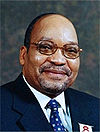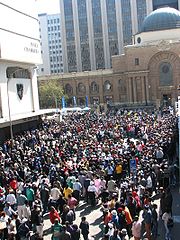
Jacob Zuma rape trial
Encyclopedia

Jacob Zuma
Jacob Gedleyihlekisa Zuma is the President of South Africa, elected by parliament following his party's victory in the 2009 general election....
, the President of South Africa
South Africa
The Republic of South Africa is a country in southern Africa. Located at the southern tip of Africa, it is divided into nine provinces, with of coastline on the Atlantic and Indian oceans...
starting in 2009 and current president of the governing political party, the African National Congress
African National Congress
The African National Congress is South Africa's governing Africanist political party, supported by its tripartite alliance with the Congress of South African Trade Unions and the South African Communist Party , since the establishment of non-racial democracy in April 1994. It defines itself as a...
(ANC), was charged with rape
Rape
Rape is a type of sexual assault usually involving sexual intercourse, which is initiated by one or more persons against another person without that person's consent. The act may be carried out by physical force, coercion, abuse of authority or with a person who is incapable of valid consent. The...
in the Johannesburg
Johannesburg
Johannesburg also known as Jozi, Jo'burg or Egoli, is the largest city in South Africa, by population. Johannesburg is the provincial capital of Gauteng, the wealthiest province in South Africa, having the largest economy of any metropolitan region in Sub-Saharan Africa...
High Court
High Court
The term High Court usually refers to the superior court of a country or state. In some countries, it is the highest court . In others, it is positioned lower in the hierarchy of courts The term High Court usually refers to the superior court (or supreme court) of a country or state. In some...
on 6 December 2005. The accuser, Zuma's deceased friend's daughter, was known by Zuma to be HIV positive. On 8 May 2006, the Court dismissed the charges, agreeing that the sexual act in question was consensual. During the trial, Zuma admitted to having unprotected sex with his accuser but claimed that he took a shower afterwards to cut the risk of contracting HIV. This statement has been condemned by the judge, health experts, AIDS activists and the public in general.
Pre-trial events
In November, 2005 an investigation began into charges that he had raped a 31 year old family friend at his home in Forest TownForest Town
Forest Town may refer to:*Forest Town, Gauteng, South Africa*Forest Town, Nottinghamshire, England...
, Johannesburg. Even before charges were filed, the news media reported that the alleged victim was a member of a prominent ANC family and also an AIDS activist; and that Zuma had acknowledged a consensual sexual relationship with the woman in question.
On the morning of December 6, 2005, rape charges against Zuma were formally filed. Zuma vehemently denied the charges, and affirmed his political commitment to oppose sexual violence.

Trial
Jacob Zuma was tried in the Johannesburg High Court. As he did throughout the trial, Zuma sang Awulethu Mshini WamiUmshini wami
Umshini wami, also known as Awuleth' Umshini Wami , is a popular Zulu language "struggle song" used formerly by members of Umkhonto we Sizwe, the military wing of the African National Congress during the struggle against Apartheid in South Africa...
(Bring my machine gun
Machine gun
A machine gun is a fully automatic mounted or portable firearm, usually designed to fire rounds in quick succession from an ammunition belt or large-capacity magazine, typically at a rate of several hundred rounds per minute....
) with the crowd, and ANC Youth League and Communist Party Youth League spokesmen spoke in support of Zuma. Zuma had not entirely lost his support base.
As Zuma's rape trial proceeded, reports surfaced that the South African Communist Party was severely divided over how to address the issue of Zuma and the SACP's relationship to him. Many members of the party's youth wing supported Zuma while others in the SACP were skeptical about the value of rallying behind a particular person as opposed to emphasizing principles of governance.
Despite the defection of some former supporters, however Zuma stalwarts continued to rally outside the courthouse, arousing criticism by anti-rape groups for regular attacks on the integrity and moral standing of Zuma's accuser, insults yelled at a close friend of the accuser, and even stones thrown at a woman that members of the crowd mistook for the accuser. Zuma's defense team introduced evidence relating to the woman's sexual past, and asserted that the sex that took place was consensual. The prosecution asserted that her lack of resistance was due to a state of shock, and that the relationship between the two was like that of a 'father-daughter' pair.
The trial also generated political controversy when Zuma, who headed the National AIDS Council, admitted that he had not used a condom when having sex with the woman who now accuses him of rape, despite knowing that she was HIV-positive. He stated in court that he took a shower to try to reduce his risk of infection, upsetting HIV educators who emphasized that this would do nothing to prevent HIV transmission.
Result
On May 8, 2006, the court found Zuma not guilty of the charge of rape.On July 3, 2007, Fezeka Kuzwayo, the woman who brought the rape charges against Mr. Zuma, was granted asylum
Right of asylum
Right of asylum is an ancient juridical notion, under which a person persecuted for political opinions or religious beliefs in his or her own country may be protected by another sovereign authority, a foreign country, or church sanctuaries...
in The Netherlands.

